At the internationally renowned 2024 ESMO (European Society for Medical Oncology) Congress, held from September 13-17 in Barcelona, Spain, five clinical research achievements from Sun Yat-sen University Cancer Center (SYSUCC) were featured as oral presentations. Notably, two studies on CLDN18.2-targeted antibody-drug conjugate (ADC) and B7H3-targeting ADC were selected as proffered papers, while the remaining three were presented as mini orals, capturing significant attention from the international oncology community.
On September 15, 2024, during the "Developmental Therapeutics" proffered paper session, Prof. Xu Ruihua from SYSUCC delivered an oral presentation titled “CLDN18.2-Targeted Antibody-Drug Conjugate (ADC), SHR-A1904, in Patients with Gastric/Gastroesophageal Junction Cancer (GC/GEJC): A Phase I Study.” The study evaluated the safety and efficacy of SHR-A1904 in CLDN18.2-positive GC/GEJC patients, revealing a manageable safety profile and promising anti-tumor activity. Among patients who had both baseline and at least one post-baseline assessment, the objective response rate (ORR) was 55.6%, and the disease control rate (DCR) was 88.9% at a dosage of 6.0 mg/kg. Prof. Xu’s team aims to further validate SHR-A1904's efficacy in larger clinical trials in the near future.
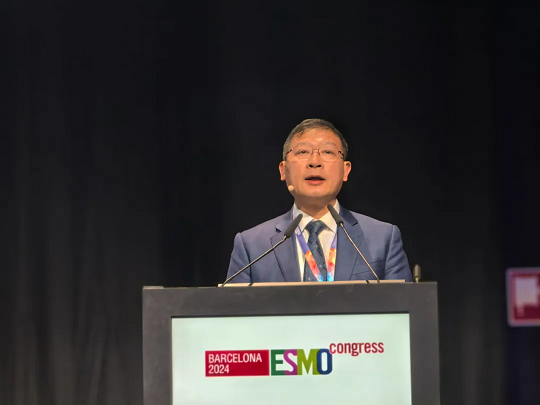
In another proffered paper session on Developmental Therapeutics, held on September 13, Prof. Zhao Hongyun from Prof. Zhang Li’s group presented a study titled “YL201, a Novel B7H3-Targeting Antibody-Drug Conjugate (ADC) in Patients with Advanced Solid Tumors: Results from a First-in-Human Phase I Study.” YL201 is a B7H3-targeting ADC equipped with a tumor microenvironment-activatable linker and a novel topoisomerase I inhibitor payload, demonstrating significant anti-cancer potential. The trial results indicate that YL201 exhibits promising efficacy in patients with heavily pretreated advanced solid tumors, alongside a manageable safety and tolerability profile, offering hope for a new potential treatment option for these patients.
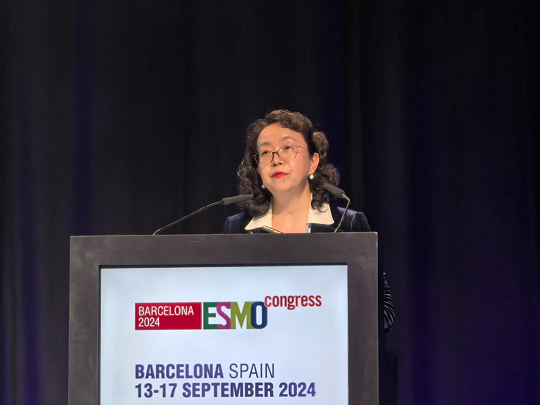
Relapsed or refractory (R/R) peripheral T-cell lymphoma (PTCL) is an aggressive and heterogeneous malignancy that currently lacks a standard treatment, making it a challenging area in clinical research. On September 15, Prof. Li Zhiming presented his talk, “Combination of Mitoxantrone Hydrochloride Liposome with Chidamide in Patients with Relapsed or Refractory Peripheral T-Cell Lymphoma: A Phase I/II Study,” in Mini Oral Session 2: Hematological Malignancies. Both mitoxantrone hydrochloride liposome (PLM60) monotherapy and chidamide (CHI) monotherapy have demonstrated some efficacy and safety in treating R/R PTCL. This study innovatively explored the combination of these two therapies. The trial results showed that the PLM60-CHI regimen has promising efficacy with a manageable safety profile, offering new hope for the treatment of PTCL patients.
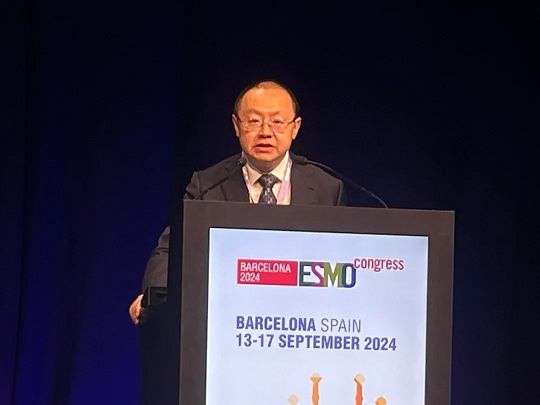
Overcoming drug resistance and enhancing the efficacy of endocrine therapy have long been central goals in the treatment of HR+/HER2- breast cancer. On September 16, Prof. Wang Shusen presented a talk titled, “Tibremciclib (BPI-16350) Plus Fulvestrant in Patients with HR+/HER2- Advanced Breast Cancer After Progressing on Endocrine Therapy: A Randomized, Multicenter, Double-Blind, Phase III Study,” during Mini Oral Session 2: Breast Cancer, Metastatic. Prof. Wang’s study demonstrated the efficacy and safety of tibremciclib in combination with fulvestrant for patients with HR+/HER2- locally recurrent or metastatic advanced breast cancer who had experienced disease progression after endocrine therapy (ET). This research offers new insights and potential changes to the overall treatment paradigm for these patients.
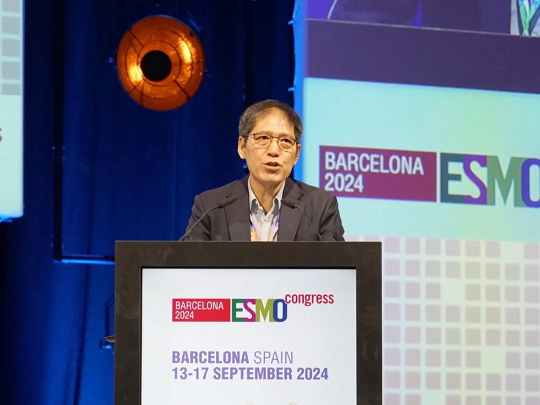
On September 13, 2024, during the Mini Oral Session: Sarcoma, Prof. Qiu Haibo presented a talk titled “Updated Efficacy Results of Olverembatinib (HQP1351) in Patients with Succinate Dehydrogenase (SDH)-Deficient Gastrointestinal Stromal Tumors (GIST) and Potential Mechanisms of Action (MOA).” The trial results demonstrated that olverembatinib exhibits sustained clinical efficacy in treating SDH-deficient GIST, highlighting its potential benefits and setting a benchmark for future research in this rare GIST subtype.
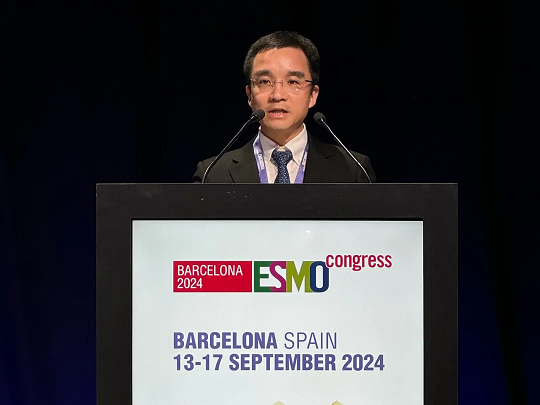
The ESMO Congress is a globally influential oncology forum that brings together physicians, researchers, and healthcare industry professionals from around the world. Each year, the latest advances in cancer prevention, diagnosis, and treatment are unveiled and discussed by the global oncology community. In recent years, China has made significant strides in oncology, with an increasing number of Chinese scholars stepping onto the international stage and making their voices heard at prestigious events like the ESMO Congress. China's growing capabilities in original drug development and clinical study design have garnered widespread recognition from the international community.
In the past five years, more than 70 clinical research achievements from Sun Yat-sen University Cancer Center (SYSUCC) have been recognized and incorporated into international treatment guidelines. As one of China’s leading academic cancer centers, SYSUCC remains dedicated to advancing personalized, high-quality care for cancer patients and continues to drive progress in the field.
Written by: Liao Shuang, Zhai Huiwen, Sun Yat-sen University Cancer Center




